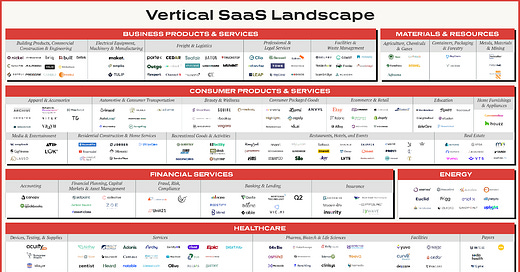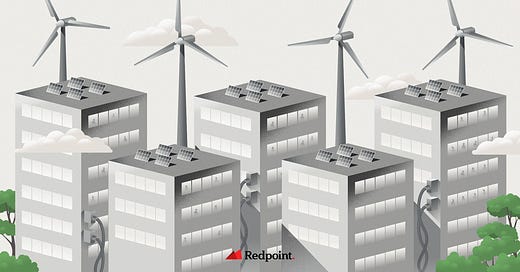
Discover more from The Conscious Consumer
Network Knowledge: Crowdsourcing the 2023 Consumer Outlook
With our new Network Knowledge series, we're bringing together some of the brightest minds across asset classes to unpack the far reaching ramifications of the year to come's consumer correction.
At Redpoint, we very much view investing as a team sport. Accordingly, we find gratification in collaboration and strive to soak up the learnings of the brightest minds around us at every opportunity we get.
As we look ahead to 2023 and a macro landscape that’s looking weirder by the week, we’ve found ourselves eager to unpack the implications across asset classes as a means of framing our own understanding of all things consumer. Today, we’re excited to share some readouts from a few friends of the firm. From real estate and venture debt to early stage incubations and art, we hope you enjoy these musings as much as we do.
Catherine Jhung, The Venture Debt Perspective
Senior Managing Director, Hercules Capital (LinkedIn)
How have the growing macro headwinds impacted risk appetite for consumer exposed companies in your asset class?
Given that B2C companies are inherently exposed to potential fluctuations in consumer demand, tighter market conditions such as we are currently experiencing, can put additional pressure on growth projections and cash needs for the business. As venture debt investors, this is something we are aware of and thoroughly diligence regardless of market conditions. What we are currently seeing many B2C (or B2B for that matter) companies focusing on is streamlining operations and achieving profitability in the nearest-term possible, in some cases foregoing faster top-line growth. We see funding sources narrowing on both equity and debt, but funding is still available, and deals are getting done. As venture debt investors, among other things, in our B2C investments we look for scale, large TAM, strong product-market fit, and lean operations that give companies the ability to withstand the potential fluctuations in consumer demand.
What do you think are the most underappreciated impacts of the current macro environment to the consumer?
Some direct-to-consumer brands have stocked up a lot on inventory post pandemic and with slower demand are more willing to offer sales and promotions to unload some of that inventory.
Where do you foresee the greatest investment opportunities to be heading into 2023?
In our ecosystem, 2023 has the potential for bright spots. Many high-quality companies that were only considering equity in 2020-2022 are now exploring venture debt as they look to be very acquisitive in early 2023, grow into their valuation, and / or want more flexibility on IPO timing. Furthermore, sustainable and renewables sectors are finally seeing tailwinds from significant legislation and increased VC investments, and we expect to see more opportunities in this sector moving forward.
Wesley Panek, The LP Perspective
Principal, Screendoor Partners (LinkedIn)
How have the growing macro headwinds impacted risk appetite in your asset class?
Screendoor laser focuses on emerging venture fund managers from underrepresented backgrounds, so many of the very real macro headwinds others LPs face (like public market exposure) don't really affect us. In Q4, we’ve seen a ~2x uptick in the number of funds we’re evaluating compared to historical averages. While this reflects the macro narrative that VC fundraising is up YoY, much of that capital has gone to larger, more established funds, so there is an opportunity for us to find value and opportunity in newer GPs. This is energizing, though we're continuing to take care to probe on things like fund size and portfolio construction. In this environment, we really want to see differentiated strategy and patient execution.
What do you think are the most underappreciated impacts of the current macro environment to consumer investing?
We’ve seen a broadening base of consumer funds as of late, ranging from straight down the fairway consumer brands and a tech-enablement focus, to sectors like climate, fintech, and future of work. Common elements of GPs’ consumer theses are that overlooked consumers (e.g., underrepresented minorities) care about new things (e.g., environment) in new ways (e.g., web3). A lot of these managers are having a hard time raising, or are planning for the process to take much longer than usual, as LPs are less keen than ever at the prospect of 'consumer' — especially for less tenured GPs. This is giving rise to more creative strategies, like hybrid VC / PE approaches with lower loss ratios but far fewer homeruns by VC standards.
Daniel Ron, The Real Estate Perspective
Managing Partner, Scarlet Capital Group (Scarlet Capital Group)
How have the growing macro headwinds impacted risk appetite for consumer exposed companies in your asset class?
While consumer sentiment remains positive, investor and lending appetite for new projects has pulled back noticeably. Construction costs have not yet adjusted downwards for this rising rate environment, throwing the market — at least temporarily — out of equilibrium. Developers are dropping and delaying projects until development yields can offer a meaningful spread over the cost of borrowing, which could create headwinds heading into the new year.
What do you think are the most underappreciated impacts of the current macro environment to the consumer?
Though it hasn't shown yet, consumer spending is likely to slow in coming months. Consumers will have more options for high quality real estate solutions — homes, apartments, work spaces, retail stores — at far more reasonable prices than have been seen in recent quarters.
Where do you foresee the greatest investment opportunities to be heading into 2023?
We've focused our development efforts on inspired, design-forward workspaces in Class A locations. With construction costs stubbornly high, we have found opportunity in buying existing structures below replacement cost with unique architectural elements. What we’ve seen is that modern companies and creators are gravitating towards unique buildings that enable maximum creativity and reflect their individuality. We believe that flexible solutions will become the standard as companies rapidly evolve in this economic environment.
Ben West, The Incubator Perspective
Partner, Juxtapose (LinkedIn)
How have the growing macro headwinds impacted risk appetite for consumer exposed companies in your asset class?
As a creation-oriented investment firm, our theses tend to take a very long view on core and fundamental consumer behavior — namely prioritizing consumer businesses that have long-term resonant value propositions and are participating in large pools of existing spend. This perspective hasn't changed. Where we are certainly more cautious in our concept development process is on the capital markets front as a big part of our process is ensuring that our product and financial plan for the first ~24-months is highly achievable and our new businesses have minimal near term financing risk. So, while we're usually generally more cautious than a VC fund, we’re probably even increasingly cautious now.
What do you think are the most underappreciated impacts of the current macro environment to the consumer?
The whiplash over the last three years has been unprecedented. We think that aside from absolute levels in interest rates, inflation, etc, the speed with which we've gone from one environment to the next — and then reversed — creates a strain on consumer behavior and decision-making that's currently under-appreciated by analysts and investors alike. In the coming quarters, this will be expressed in consumer hesitation surrounding certain behaviors and impulsiveness around others, where consumers perceive scarcity or a limited window of opportunity.
Where do you foresee the greatest investment opportunities to be heading into 2023?
Consumer financial decision-making has been strained by the massive gyrations in markets and the end of a historic bull market. We believe that consumers will increasingly seek out higher-confidence ways of making financial decisions — while this could start across investing / borrowing / taxes, it could even extend to things like professional compensation. We are excited about opportunities to build fintech solutions that are “definitively” the best option for a subset of consumers to navigate a broad set of financial decisions against the backdrop of today’s complicated macro environment.
Julia Lipton, The Crypto Perspective
General Partner, Awesome People Ventures (Twitter)
How have the growing macro headwinds impacted risk appetite for consumer exposed companies in your asset class?
Across web3, there has definitely been a shift away from consumer and towards infrastructure. Today, many are concluding that in web3 the killer consumer use cases and business models aren't clear yet. As a result, more and more developers are now working on known solvable problems at the infrastructure layer. In addition, as investors seek returns, they’re realizing that token based projects were the ones driving outsized returns for VCs in the last bull market, as they tend to have faster liquidity and markups. Since most token based projects are infrastructure or DeFi related (i.e.: not consumer), the shift in capital markets has made consumer projects increasingly challenging to get off the ground.
What do you think are the most underappreciated impacts of the current macro environment to the consumer?
For years VCs subsidized consumers' lives — they helped decrease the cost of beloved products like Uber, DoorDash, and Opendoor, to name a few. Fast forward to 2023, those days of "low cost VC-backed products" are coming to a close as those companies are increasingly pushing towards profitability as they more intentionally cut costs while still trying to increase revenue. Between overall inflation pressures and this specific push towards profitability, products are likely become increasingly expensive for end consumers — which might come as a shock for those who have embraced the wave of the past several years.
Where do you foresee the greatest investment opportunities to be heading into 2023?
These days, I’m primarily investing in web3 and, accordingly, remain bullish on the blockchain. Outside of this thesis, I think women's health is finally heating up (thankfully!) and climate tech is poised to benefit from strengthening regulatory tailwinds.
Jordan Huelskamp, The Fine Art Perspective
Founder, Salon (Salon)
How have the growing macro headwinds impacted risk appetite for consumer exposed companies in your asset class?
During the Fall auction season, art collectors showed a resilient appetite for art across categories. New York's Autumn sales totaled $3.19 billion, up $455 million from May's sales and $650 million from the previous year’s Autumn sales. In the primary market, recent indications show that galleries have adjusted prices to account for inflation and a surging dollar, which momentarily gave American collectors an edge buying overseas this Summer and early Fall. As headwinds continue, expect collectors to focus their purchases with the "blue chip" category—investment-grade assets whose prices are more predictable and stable in comparison to the speculative market for emerging art.
Where do you foresee the greatest investment opportunities to be heading into 2023?
In recent years, companies like Masterworks—as well as the feverish NFT bubble—brought art investment to mass audiences, empowering a new generation of digitally-savvy collectors to purchase and trade art for the first time. As interest in art as an alternative asset continues to grow, fueled by new technology, I expect alternative investment models to blossom in the fine, physical art space. As an example, my organization Salon is a community-driven art fund that decentralizes ownership and decision-making among a group of experienced blue chip art collectors. Structured as a DAO and facilitated by decentralized technology, our members propose and vote in acquisition decisions while hosting works from our collection within their homes. Our fund has made strategic decisions to avoid NFTs and ultra-emerging art, instead favoring upmarket works by artists with established markets—the latter have proven to be durable assets with long-term appreciation potential, including during times of economic headwinds.
Paul Grossinger, The Rolling Fund Perspective
Co-Founder, Gaingels (Gaingels)
How have the growing macro headwinds impacted risk appetite for consumer exposed companies in your asset class?
Macro headwinds are forcing companies — especially in consumer — to be much more thoughtful on managing cash than in recent years. At Gaingels, we’ve worked very actively with our founders on cash management, extensions, and burn reduction, among other tools to solve for this emerging pain point. A few months in, what we’ve seen is that founders who were proactive to address the problem head on by taking the hard but necessary steps early are, for the most part, doing fine.
What do you think are the most underappreciated impacts of the current macro environment to the consumer?
I think the biggest impact, especially in an inflationary environment, is that people are more thoughtful surrounding what they buy. As a result, a lot of nice to have categories (i.e.: non “food, shelter, kids”) are tangibly impacted. This, combined with FAANG-driven changes to how consumer companies can directly advertise to potential customers and, relatedly, the depth of data they can access, is driving major — and, arguably, needed — changes to how smart consumer CEOs operate.
Where do you foresee the greatest investment opportunities to be heading into 2023?
For me in 2023, I’m very focused on venture-led Seed to Series B stage businesses — especially those led by amazing LGBT and / or diverse CEOs, as well as ally CEOs who are eager to represent inclusion. I think the coming year will produce a lot of great, well priced investments, which makes me excited about the overall outlook despite the headwinds mentioned above.
Though far from the up and to the right environment of the past decade, we at Redpoint, informed by this ecosystem of investors, remain as eager as ever to explore a wide range of opportunities across the early stage ecosystem. From mission-driven marketplaces to sustainability-oriented software solutions, few things fill up my cup more than investing in new ideas and individuals. If you’re as excited about this exploration as we are, find me on Twitter at @itsmeeraclark and subscribe to my Substack via the link below!





